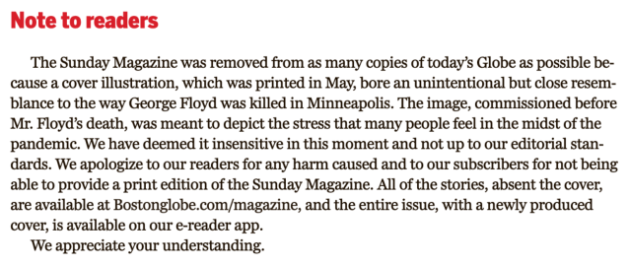
COVID-19 testing. 2020 photo via U.S. Air Force.
Previously published at GBH News.
If we’re lucky, we’ll never encounter another time as awful as 2020. A raging pandemic, economic collapse, white racism in the face of a long-overdue reckoning with racial justice and an authoritarian-minded president who is still plotting to overturn his decisive defeat have all conspired to make this a year to put behind us.
Then there were the personal tragedies. “I remember that first Thanksgiving, the empty chair,” said President-elect Joe Biden, a man who knows tragedy in his bones and in his soul. The lost job. The lost business. The lost hope.
During the past year, I’ve tried to capture some of that — the lows as well as a few reasons for optimism. Below are 10 of my GBH News columns. They’re in chronological order, starting with the world we lost and ending with a glimpse of better days to come.
• The strangling of local radio, Jan. 21. The New Year had barely begun when we learned that iHeartMedia, a conglomerate that owns some 850 stations, was gutting its properties. Among them: Boston’s venerable WBZ (AM 1030), the city’s last remaining commercial news station, which laid off several longtime journalists. For-profit radio has been sliding downhill since the Telecommunications Act of 1996, which effectively removed caps on how many stations a company can own. As with newspapers, a few giant corporations took on massive amounts of debt to build empires, slashing costs so they could pay their creditors. Employees and listeners were the losers.
• The last normal week, March 4. I spent Super Tuesday in Ukiah, California, covering a packed event in a bar (imagine that) hosted by The Mendocino Voice, a small website that was transitioning from for-profit to cooperative ownership. “We are going to be owned by our readers and our staff,” publisher Kate Maxwell told those on hand. “We think that’s the best way to be sustainable and locally owned.” By the end of the week, I found myself accompanying Maxwell and managing editor Adrian Fernandez Baumann to Mendocino County’s first news conference about what was then called “the novel coronavirus.” A day later I returned home on a half-empty flight wondering what was coming next.
• A campus empties out, March 17. Northeastern University, where I’m a journalism professor, takes its spring break the first week of March. Despite the increasingly ominous news, we actually resumed classes the following week. All of us, though, had the sense that a shutdown was imminent — and it was, as we all had to scramble quickly to move our classes online. This fall, like most of my colleagues, I taught partly in person, partly online, getting tested twice a week. And I am filled with gratitude every day to be one of the lucky few who is still employed and working in a relatively safe environment.
• Fox News endangers lives, April 22. Rupert Murdoch’s cable news station has become a dangerous behemoth, promulgating all manner of misinformation and disinformation about climate change, Hillary Clinton and the awesome wonderfulness of President Donald Trump. Never, though, was Fox News more of a menace than it was in the spring of 2020, when prime-time hosts Tucker Carlson, Sean Hannity and Laura Ingraham promoted the toxic idea that COVID-19 (it finally had a name) was a “hoax.” They disdained mask-wearing and cheered on the armed right-wingers who protested the shutdown, falsely claiming that COVID was nothing to worry about. “The question is why are our leaders hurting us on purpose,” Carlson told his viewers. “And the answer is: Because they can.”
• Avoiding a 2016 repeat, May 27. With Biden having vanquished his Democratic primary opponents and building a solid polling lead over Trump, I asked whether the media could avoid the mistakes they made in 2016 — obsessing over Hillary Clinton’s emails and elevating her minor transgressions so that they appeared to be as serious as Trump’s. In fact, the media appeared to have learned some lessons. Sexual assault charges brought against Biden by Tara Reade, a former Senate staffer, and, later in the year, Rudy Giuliani’s attempts to make some sort of criminal connection between Biden and his son Hunter’s dealings in Ukraine were both quickly dismissed as lacking any evidence. The next question: How will the press cover the Biden presidency?
• A newspaper laid low by racism, June 17. Alexis Johnson, a young Black reporter for the Pittsburgh Post-Gazette, had been covering the Black Lives Matter protests that broke out following the police killings of George Floyd, Breonna Taylor and others. Then she tweeted out a humorous but pointed observation comparing the damage caused by looters to the mess left behind by tailgaters at a Kenny Chesney concert. She was taken off the protest beat for supposedly failing to maintain her objectivity — a ludicrous overreaction met with protests by her fellow journalists and the community. Before long, Johnson had left for Vice News and the Post-Gazette had a new executive editor: Stan Wischnowski, who’d just left as executive editor of The Philadelphia Inquirer after he approved an insensitive “Buildings Matter, Too” headline. Wischnowski was actually an upgrade over his predecessor, Keith Burris, who continues to run the editorial pages. But he was hardly the sort of change that was called for under the circumstances.
• In the dark on Beacon Hill, July 16. Massachusetts is just one of four states whose legislatures are exempt from public-records laws. Cities, towns, counties and state executive agencies must turn over payroll records, contracts, internal communications and other documents when asked to do so by journalists or ordinary citizens. But not the Legislature. “The Legislature has no interest in changing the status quo,” said Robert Ambrogi, executive director of the Massachusetts Newspaper Publishers Association. And so it remains. In the fall, Northeastern journalism students asked every legislative candidate whether they favored ending the exemption. Most of those who answered said they did — but only 71 of the 257 candidates bothered to respond despite repeated email and phone requests.
• Local news, saner views, Nov. 11. With the election over and the Trump era drawing to an end, I explored the idea of whether a renewed focus on community life could help overcome the hyperpolarization that has ripped the culture apart at the national level. Before that can happen, though, we need to find ways to revive local journalism. One modest solution would be to create a special state commission to study the problem in Massachusetts and make some recommendations. As 2020 draws to a close, the legislation that would create that commission remains in limbo.
• Linda Henry takes charge, Nov. 18. Some five months after Vinay Mehra exited as president of Boston Globe Media Partners, managing director Linda Pizzuti Henry got a title enhancement: she was named chief executive of the company, which comprises The Boston Globe, Stat News and Boston.com. Although the COVID-related advertising meltdown hurt the Globe as it did every other media company, 2020 turned out to be a good year for owners John and Linda Henry. The Globe’s paid digital circulation passed the long-sought 200,000 mark, and Stat News emerged as a national leader on COVID coverage. Moreover, the company employs about 300 full-time journalists across its three platforms — a far higher number than would be expected under chain ownership. That said, the company continues its unseemly battle against its union employees, a situation that should have been resolved long ago.
• Back to a better future, Dec. 2. Are there reasons to be optimistic? We all hope so. President-elect Biden and Vice President-elect Kamala Harris will restore civility to the White House. A COVID vaccine has brought the end of the pandemic within sight. But what about beyond that? In a new book, “The Upswing,” Robert D. Putnam and Shaylyn Romney Garrett argue that the selfishness that led to the original Gilded Age eventually gave way to the Progressive Era, the New Deal and the Civil Rights Movement — and that it can happen again.
We are entering what is likely to be a devastating winter — what Dr. Robert Redfield, director of the Centers for Disease Control and Prevention, predicted could be “the most difficult in the public health history of this nation.” We need to take care of each other and get beyond the sickness and fear that have come to dominate our lives. And we have to tell ourselves that things will get better — and work to make it come true. What alternative do we have?
Finally, my thanks to GBH News for the privilege of having this platform and to you for reading. Best wishes to everyone for a great 2021.






